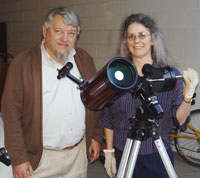
Lunar Videogames Bring Science to Life for Students
Oct 21 2010
By Keri Brown
West Virginia Public Radio
 Chuck Wood and Debbie Reese are using their lunar science research to create educational videogames for children and adults.
Chuck Wood and Debbie Reese are using their lunar science research to create educational videogames for children and adults. The Center for Educational Technologies at Wheeling Jesuit University is using its research into lunar science to develop educational video games for children. The games let students build, explore, and conduct their own experiments to learn more about the Moon.
The Center for Educational Technologies research into cyber-based learning is developing a better understanding of how students learn in virtual worlds and game-based instructional environments.
Selene: A Lunar Construction GaME is designed for people ages 9 and up and is a single-player game.
"What we have done," said Debbie Denise Reese, senior researcher at the center, "is taken scientist Chuck Wood's knowledge of how the Moon formed and changed over time, what's invisible inside his head, and transformed that into a concrete game world that players can interact with. Our players actually form the Earth's Moon and then they pepper it with impact craters and flood it with lava flows."
Students learn several science-related concepts while playing Selene. Reese recently tested the game with some Ohio County students.
"I kind of like shooting the asteroids," said Carla Nelson, a seventh-grader at Triadelphia Middle School. "It is a lot of fun. You learn things about the density and the heat and radiation. Very educational."
Another educational game that the Center for Educational Technologies is producing is called MoonWorld. In MoonWorld players can work independently or in groups to explore and conduct their own research as astronauts.
"We have programmed certain goals that we want students in their avatar uniform to try to achieve, but the way they achieve those is up to them," said Chuck Wood, director of the center. "For example, if they want to walk over to this impact crater in the background to examine it and to make observations there, they can do that. If they want to go over to that site, they can do it, so there is choice as to how they conduct their learning."
MoonWorld has been available online to those 18 and older for about a year, but Wood said upgrades are making it more secure and user friendly for children.
"What we want them to learn is not so much the science of the Moon or the science of the Earth, but how to make observations, how to have theories that they want to collect data about to make the best interpretations, the best decisions, and that is an important goal for whether they might grow up to be a scientist or whether they grow up to be a consumer that needs to evaluate input for the best course of action to take," he said.
MoonWorld is funded by a grant from NASA. Selene was created with funds from the space agency and is now being supported by the National Science Foundation.
Researchers at the center are also using technology to measure how players learn. Both Selene and MoonWorld use embedded assessments that collect data throughout the gameplay.
"We can measure our players' progress toward the game goal, and we measure it every 10 seconds of gameplay," Reese said. We have matched video of gameplay where we show a player learning a concept and then looked at that in our game data and shown exactly the millisecond where the player learned that concept."
Reese said a goal of the Center for Educational Technologies is to get the educational games in schools across West Virginia.
Rosemary Anderson, director of the Anchor Program at Ohio County Schools, said the games are a good resource for both teachers and students.
"This is chance for students to do some critical thinking and play a game, and we know these students learn from playing games," Anderson said." This is part of their inheritance right now. They have grown up in the digital age and to give something educational and something to increase their knowledge base after school is just a great idea."
Since both games are research based, players or their parents or guardians must complete a consent form to play the games.
The center is looking for thousands of children to play Selene. To sign up as a recruiter or play Selene, visit the Selene website at http://Selene.cet.edu or contact Lisa McFarland at 304-243-2479 or lisamc@cet.edu.
The new version of MoonWorld will be released in December.



